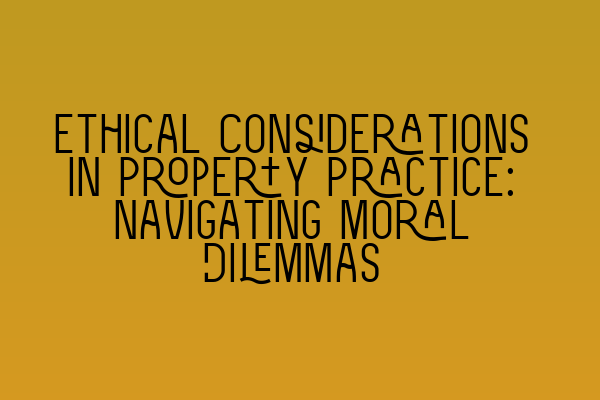Ethical Considerations in Property Practice: Navigating Moral Dilemmas
In the world of property law, solicitors play a vital role in facilitating transactions, resolving disputes, and providing professional advice to clients. However, the practice of property law is not without its ethical challenges. Navigating moral dilemmas requires a thorough understanding of the relevant laws and regulations, as well as a commitment to upholding ethical standards.
The Importance of Ethics in Property Law
Ethics are the principles that guide professional conduct and ensure the fair and just treatment of all parties involved. In property practice, it is essential to maintain a high level of integrity and ethical behavior to protect the interests of clients, the public, and the reputation of the legal profession as a whole.
Conflicts of Interest
One of the most common ethical dilemmas in property practice is conflicts of interest. Solicitors must ensure that their personal interests or connections do not compromise their duty to act in the best interests of their clients. If a conflict of interest arises, the solicitor has a duty to disclose it to the affected parties and take appropriate steps to mitigate any potential harm.
For example, imagine you are a solicitor representing a seller in a residential property transaction. If you also have a personal relationship with a potential buyer or have a financial stake in the property, it is imperative to disclose this conflict to both the seller and the buyer. Failing to do so could result in professional misconduct and legal consequences.
It is essential for solicitors to implement clear conflict of interest policies within their firms and regularly review and update them. By doing so, solicitors can proactively identify, manage, and resolve conflicts of interest, ensuring that their clients’ interests are always at the forefront.
Client Confidentiality
Client confidentiality is another crucial ethical consideration in property practice. Solicitors have a duty to protect the confidentiality of client information and ensure that sensitive details are not disclosed without proper authorization. This duty extends even after the client-solicitor relationship has ended.
It is important to remember that solicitors cannot use client information for personal gain or share it with third parties without consent, unless required by law. Breaching client confidentiality not only violates ethical standards but can also lead to severe legal consequences.
For instance, if a solicitor representing a property developer learns of confidential information that may impact the value of a property, that information cannot be shared with potential buyers to gain a financial advantage. Such actions undermine the integrity of the legal profession and can result in professional sanctions.
Professional Competence and Continuing Professional Development
Property law is a complex and ever-evolving field. Solicitors must continually enhance their professional competence and keep up to date with the latest developments in property law. This ensures that they can provide accurate and informed advice to clients, while also delivering a high standard of service.
Continuing Professional Development (CPD) plays a critical role in maintaining professional competence. Solicitors should actively seek opportunities to attend relevant workshops, seminars, and conferences, as well as engage in self-directed learning. By doing so, solicitors can stay updated with changes in legislation, case law, and ethical guidelines.
CPD not only benefits solicitors but also their clients, as it ensures that solicitors are equipped with the necessary knowledge and skills to navigate complex ethical dilemmas and provide effective representation.
Conclusion
Ethical considerations are of paramount importance in property practice. Solicitors must navigate moral dilemmas, such as conflicts of interest and client confidentiality, with integrity and professionalism. By upholding ethical standards, solicitors not only protect the interests of their clients but also contribute to the overall reputation and trustworthiness of the legal profession.
At SQE Property Law & Land Law, we prioritize ethical practice and are committed to providing exceptional legal services while upholding the highest ethical standards. To learn more about our preparation courses for SQE exams or to check the latest SRA SQE exam dates, please visit our related articles:
